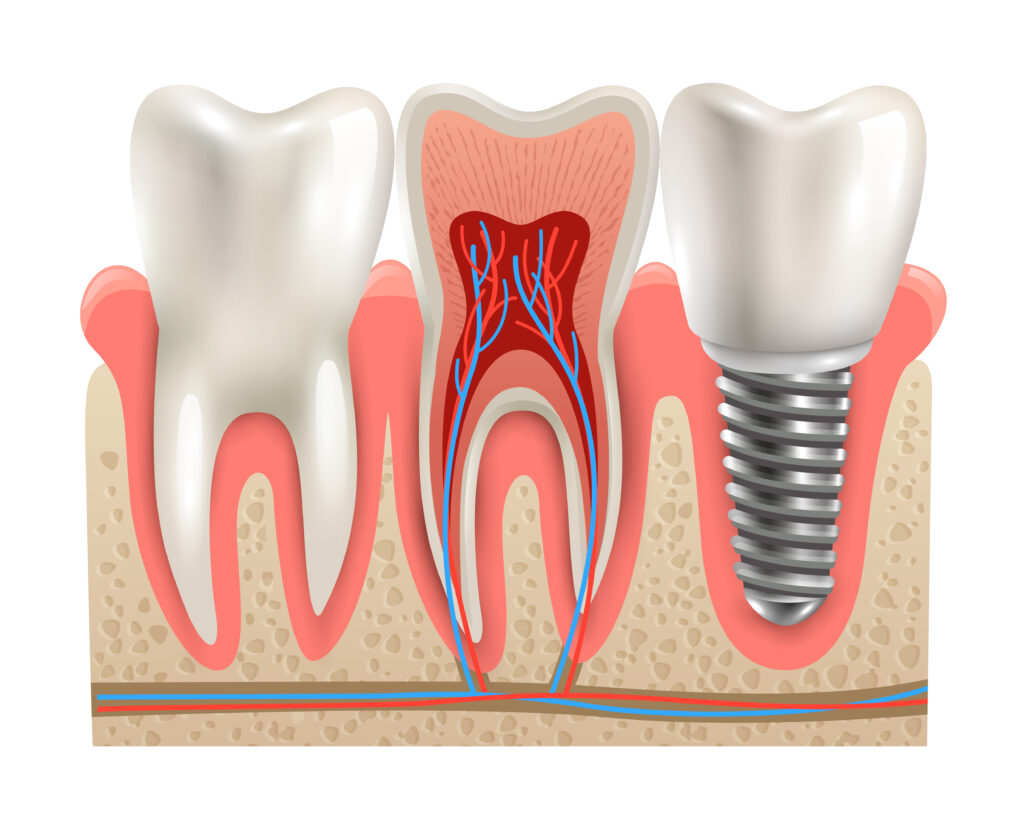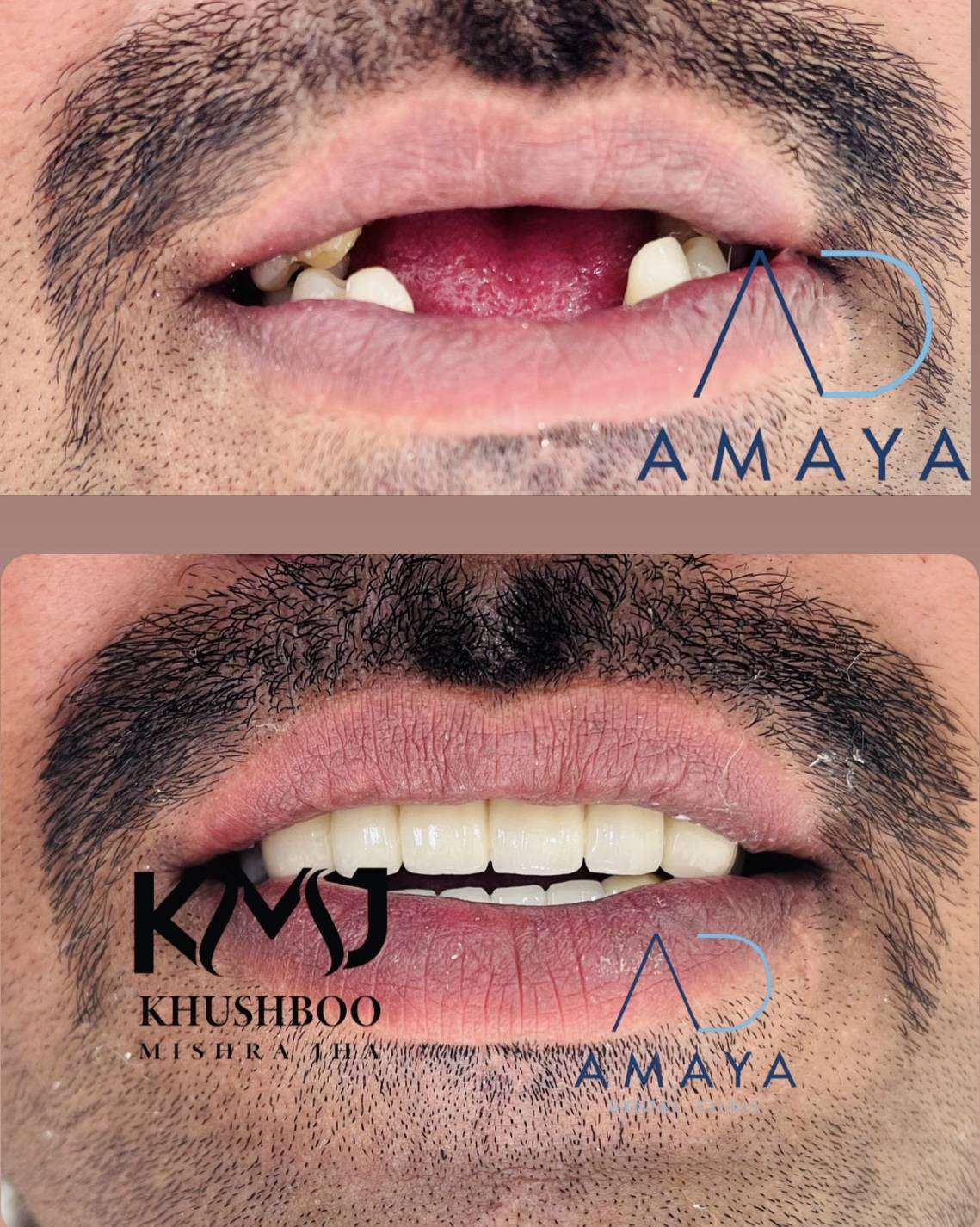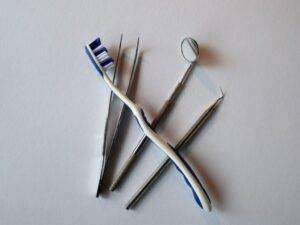Dental implants have grown in popularity as a tooth replacement option because they look and feel natural, endure a long time, and can replace one or more damaged or missing teeth. Most people have dental implant benefits, which can help restore the integrity of your bite and the fullness of your smile.
Dental implants perform their magic by blending in with your natural bone structure. Dental implants, as opposed to typical dentures or dental bridges, are securely fixed into the jawbone. This integration not only assures stability but also stimulates the bone, preventing degeneration, which is common when a tooth is lost.
Let’s take a closer look at how oral health benefits dental implants:
1. Preservation of Bone Density
Soon after tooth loss, the bone surrounding the missing tooth socket might begin to degenerate and weaken. This can cause the jawbone to lose volume and density, causing difficulties with other teeth and altering the facial appearance. To safeguard the bone, the dentist may recommend dental implants to replace the missing tooth.
This is significant because a reduction in jaw bone density increases the likelihood of breaking. You also run the risk of your other teeth shifting and becoming misaligned if you do not have a dental implant in place. Everything, from how you chew to your facial structure’s shape and contour, could be affected. Dental implants prevent bone density loss and tooth movement because the implant fills the empty socket and permanently integrates with the jaw bone through dental implant procedures.
2. Reduce the possibility of tooth decay and gum disease
If you have missing teeth, you are more likely to develop cavities and gum disease. Brushing and flossing teeth that are on the edge of falling out is challenging. Furthermore, vacant tooth sockets can collect food particles, germs, and plaque. The majority of oral health problems (such as gum disease) are caused by untreated dental plaque. Replacing lost teeth and practicing proper dental hygiene are the best ways to preserve oral health.
Dental bridges and dentures may provide more difficult-to-reach locations for bacteria to grow. In fact, if dentures are not properly cleaned, they can cause irritation and broken skin, which can serve as breeding grounds for bacteria and infection. However, once a dental implant has fully healed, the empty socket is no longer visible, and the teeth and regions between the teeth can be readily cleaned.

3. Prevent the Loss of Other Teeth
Teeth are maintained in place by their roots and the teeth around them. As a result, losing one tooth increases the likelihood of losing neighboring teeth as they shift into space. Dental implants are ideal for people who want to restore lost teeth without removing or altering their good teeth. Dental implants will support neighboring teeth, reducing their chances of becoming loose or falling out.
When a tooth is extracted and not replaced, your jawbone can degenerate. As a result, additional teeth may be lost. Wearing dentures and bridges can also put a strain on your other teeth; in some cases, your natural teeth must be ground down to allow for bridge insertion, which can lead to tooth loss. When you have dental implants, none of this is essential. Dental implants, in fact, stimulate bone growth, which benefits both your jawbone and your existing teeth.
4. Prevent Jawbone Loss
When you lose a tooth, the bone that supports and surrounds the tooth loses the stimulation and pressure that keep it dense and in shape. The jawbone will deteriorate, which may cause changes in your facial muscles and characteristics. Most people who use bridges or dentures undergo jaw shrinking, which changes the shape and general appearance of their face. Dental implants are inserted in the jawbone where your missing tooth root was and offer the stimulation the jawbone requires to sustain your muscles and facial structure.
Unlike other tooth replacement choices, a dental implant stimulates jawbone tissue in the same way as a natural tooth root does. Your jawbone requires pressure from tooth roots to stay healthy. Otherwise, your jawbone will begin to degenerate, even leading to facial collapse.
5. Improve Overall Health
Missing teeth, ill-fitting dentures, or bridgework that causes pain or self-consciousness can all have a negative impact on your self-esteem and sense of worth. Feelings like this can have a significant impact on your quality of life and, as a result, your health over time. As a result, many patients who are granted a second shot at a beautiful and perfect smile make practicing a thorough oral hygiene regimen a priority. Dental implants can improve your smile as well as your ability to eat and speak more confidently.
Read More: Top 10 Dentists in Bangalore
Dental implants indirectly boost your body’s ability to absorb vitamins and minerals. This is because implants allow you to chew more efficiently. Your body has the ability to break down food and extract nutrients. Those nutrients not only assist other parts of the body, but they also aid in keeping teeth and gums healthy.
Tip: Discover the Best Dental Clinic in Bangalore to Improve Your Oral Health
Conclusion
Finally, dental implants for overall health provide a game-changing solution. Their advantages range from restoring function to improving looks. If you’re thinking about getting dental implants, go to a skilled specialist to figure out what’s ideal for you. Say goodbye to dental problems and welcome to a bright, healthy smile.





